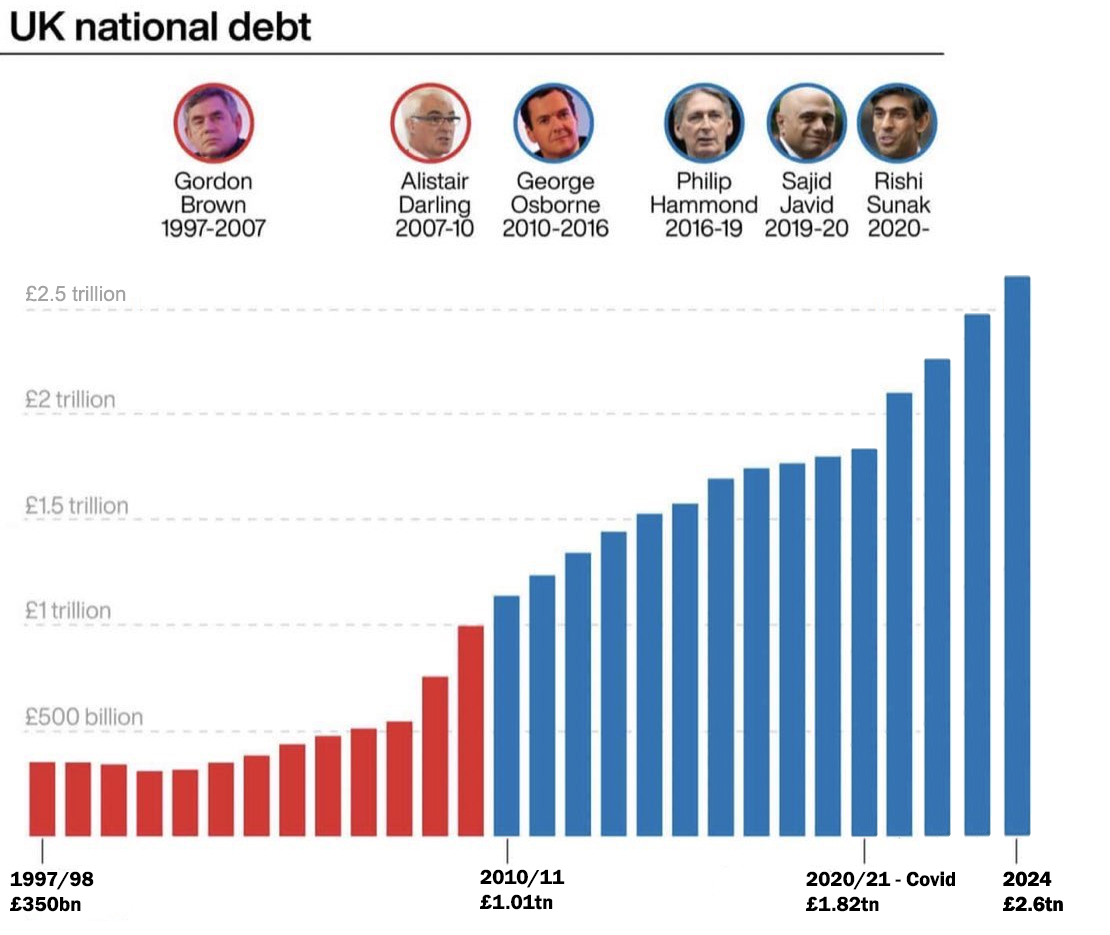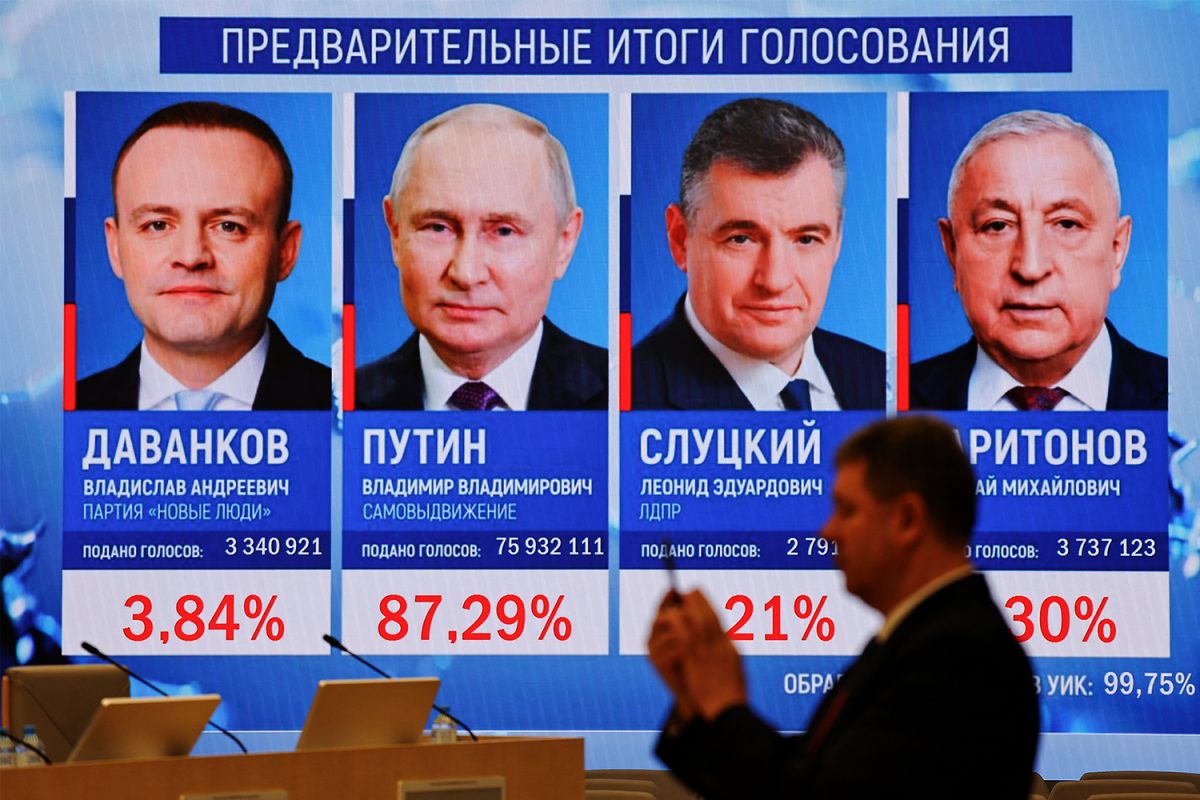British Prime Minister Rishi Sunak stood in front of 10 Downing Street in the pouring rain and announced a snap election to the shock of many in his own party. With the parliamentary term due to end in December the Tories are trailing by a huge margin in the polls, their economic record is dismal, and the party is deeply unpopular after 14 years of rule. The Tories are so unpopular over 30% of sitting Tory MPs are not standing in the election as they can see the writing is on the wall. For the masses 14 years of Tory rule has been a mitigated disaster, despite Tory claims and the benefit of Brexit remains as elusive since Britain left the EU in 2020. The opposition Labour party, according to the polls should comfortably win on 4th July but will inherit a myriad of problems and it is likely these domestic issues will impact Britain’s global position.
In 2010 the Tories returned to government after spending 13 years in the wilderness due to Tony Blair and new Labour. Immediately, Prime Minister David Cameron and his chancellor George Osborne chose austerity as their strategy, vision and ideology. Austerity was to dominate the government and the country for the next decade. The global economic crisis in 2008 revealed the banking industry was built on a pack of cards and the Labour government bailed them to the tune of £141 billion which led to an increase in the national debt and government deficit. The aim of austerity, the Tories argued, was to eliminate the national debt and through deficit elimination a budget surplus could be achieved by 2015, putting British finances in a prudent position which would give the financial markets confidence and lead to economic growth.
With the financial crisis businesses began to cut back and delay investment. This had a knock-on effect on consumer spending, as the uncertainty led many to cut expenditure. The coalition government in 2010 rather than stimulating the economy decided to force government departments to cut their spending in order to reduce the national debt. In 2010 the national debt was nearly £1 trillion (69% of GDP). The austerity strategy for the next decade would have a detrimental effect on the British economy. Between 2010 and 2019, British public spending was cut by £540 billion! The Office of Budget Responsibility, described this as “…one of the biggest deficit reduction programmes seen in any advanced economy since World War II.” Rather than raising taxes the tory government focused on shrinking the state.
The Lost Decade
The impact of a decade of austerity can be seen and felt across the UK today with Local Councils going into bankruptcy. The huge cuts to welfare led to an increase in poverty, Britain has a poverty rate of 23%, a shockingly high figure for the 6th richest economy in the world. Most government departments met their spending cuts by substantially cutting staff numbers. In the NHS, 30% of senior managers lost their jobs. Around a quarter of staff in the prison service lost their jobs. In education, teachers were forced to do more with less. Pupil to teacher ratios rose significantly since 2010, not surprisingly teachers went on strike due to their astonishingly high workloads. Between 2010 and 2018, funding for police forces in England fell by up to a quarter as a result officers stopped investigating burglaries. 43% of the courts in England and Wales were forced to close due to austerity. The social impact upon the lives of ordinary brits was devastating with many calling the 2010s the lost decade.
The impact of a decade of austerity can be seen and felt across the UK today with Local Councils going into bankruptcy
When Rishi Sunak called for elections last week the national debt stood at £2.6 trillion (104% of GDP). Over a decade of austerity failed spectacularly and the Tories failed to meet their own target. The national debt simply grew and the Tory agenda of turning a budget surplus by 2016 saw the national debt reach £1.65 Trillion, 85% higher than in 2010. The Tories had sufficiently harmed the economy on a scale that required them quickly, but quietly to soften their approach, but they refused to end the essence of austerity. Tories today blame the COVID pandemic and the Russian invasion of Ukraine for the rise in the national debt. Whilst the COVID pandemic did see an increase in government spending, on the eve of COVID-19 in early 2020 Britain’s debt was £1.82 trillion, 82% higher than 2010. The Tories had failed on austerity even if the COVID pandemic didn’t take place.
We also now know that the austerity cuts were not equally applied geographically, non-Conservative areas were targeted by the Tories. Health expenditure in Blackpool, which is a labour seat fell five times more per person than in Surrey which is dominated by Tory MPs. Conservative members have acknowledged “big strategic moves” were made to favour demographic groups more likely to vote Conservative. This meant that the richest 20% of the population were excluded from the impact of austerity cuts.
The legacy today of austerity is the fact there are more food banks in the UK than outlets of the fast-food chain McDonald’s.
The ‘Great Deflection’
Europe had created a huge rift in the Conservative party and in 2013 the British Prime minister David Cameron under pressure from many of his MPs and from the rise of the UK independence party (UKIP), attempted to deal with this by promising an ‘in-out’ referendum on Europe if the Tories returned a majority in the 2015 election. With the Tories promising more austerity cuts to the tune of £35 billion, the Prime Minister David Cameron didn’t expect to gain a majority in the election. The Tories in the end won a majority in the 2015 elections and the country voted to leave the EU in the 2016 referendum vote.
What took place in the UK from 2016 were a number of acts of self-destruction which would make a Netflix comedy if it were not so serious. As the austerity cuts were biting and literally killing an extra 120,000 people in 2017, the country was fixated on Brexit. The Tories were divided on what Brexit really meant from those who wanted to maintain some alignment with the EU and those that wanted a complete break from the EU, despite the continent being its largest trade partner. Prime Minister Theresa May was undermined by other Tory MPs who forced two no confidence votes. She stepped down in 2019 when Parliament rejected her EU deal. Boris Johnson’s premiership collapsed under the pressure of the pandemic and of his own proclivities. Whilst Liz Truss only lasted 49 days in office!
The legacy today of austerity is the fact there are more food banks in the UK than outlets of the fast-food chain McDonald’s
Many in the UK voted for Brexit blaming the problems in the UK economy upon the EU and immigration. Boris Johnson was able to win a majority in the 2019 election as many in Northern red wall (labour supporting) towns turned to him believing Brexit would fix things. The UK’s problems had little to do with the EU and everything to do with government austerity policies, but the Brexit debate was a huge deflector of the real cause of the country’s problems.
Today, four years since the UK left the EU trade talks with the US have foundered. Britain has completed trade deals with 70 nations which overwhelmingly consisted of roll over deals from the pre-Brexit era. Global investment has been affected by Britain’s loss of the EU’s single market access. Immigration reduction from the EU caused labour shortages in British sectors such as social care, agriculture and construction. However, rather than reducing overall Immigration numbers, the Office for National Statistics revealed the highest net migration levels since the Second World War. The key promise, written on the side of the Brexit bus, that leaving the EU would free up £350 million a week for the National Health Service has not materialised. Instead, the NHS is facing a funding crisis, widespread strikes and a shortage of available beds.
The Party of the 1%
The Conservative Party, despite the rhetoric that it works in the interests of the nation as a whole, is simply a party that represents the interests of the 1%. Despite advocating values of conservatism, this has really meant pursuing policies which serve the interests of the 1%. This has allowed barons, aristocrats and the merchant class in the past and billionaires today to gain a stranglehold over individual Conservative politicians to serve their narrow interests.
The Conservative party is now more reliant on a small group of donors than it has been since records began more than two decades ago, according to an analysis of records held by the Electoral Commission. The Sunday Telegraph recently concluded 75% of donations to the Tories came from just 10 people.
Will Labour Bring Change?
In 2002, Margaret Thatcher was asked for her greatest achievement. She replied: “Tony Blair and New Labour. We forced our opponents to change their minds.” The Labour party had for long been built upon protecting workers rights and the unions in the UK were for long its support base. But Labour under Tony Blair came to power with the slogan of ‘new labour.’ Tony Blair and Gordan Brown led a centre-right party that sidelined Labour’s leftist roots and supported the US on its global imperial project. For Margaret Thatcher this was her crowning achievement.
New labour meant there was consensus on how the country is to be run by the two parties in the UK, with no difference between them. So what can we expect from the Labour party who according to the Polls will comfortably win the 4th July election.
The Labour shadow cabinet is looking to continue new labour from where it left office in 2010. Its leader Keir Starmer has spent the four years since he became leader of the Labour party destroying the left and Jeremy Corbyn’s legacy. Starmer has been building his profile with both the Zionists and the business class as a person who can be relied upon and someone who can be trusted with the keys of national leadership.
The Labour leadership has been all tactical with no long-term strategy as it has been so far ahead in the polls due to the conservatives self-destructive policies. They have continued to exorcise Corbyn’s left-wing policies (Corbyn has been blocked from standing for the Party in the 4th July election), while making vague noises about everything else. It has nothing new to say about Brexit and equivocates about its own tax and spending plans, if it wins power. The Party recently scaled back a plan to invest £28 billion a year in green projects. There is no rescue on the way for Britain’s welfare state. In fact, the Labour leadership has stopped talking about public investment and plans to continue with the Tory policy of balancing the budget.
the Labour leadership has stopped talking about public investment and plans to continue with the Tory policy of balancing the budget
Global Britain
With so many domestic challenges Britain’s role in the world is diminished but a clear strategy has emerged and will be pursued irrespective of which party is in power. British foreign policy, termed global Britain, is about promoting an image of a global player due to its military and economy. Whilst the British economy has numerous structural issues, Britain’s ruling class are all in agreement that Britain should play a global role despite its declining military and economic capabilities.
The AUKUS agreement between the US and Australia and the UK to construct nuclear submarines in order to contain China is how Britain plans to play a global role, namely in coalitions, partnership and joining up with others. Russia’s invasion of Ukraine in 2022 has seen the UK take a vocal lead, even though its contribution has been miniscule. In the first weeks of Russia’s invasion British Prime Minister Boris Johnson forced Kyiv to not sign an agreement with Moscow which could have ended the war. Russia was ready to end the war and withdraw its troops in exchange for Ukrainian neutrality. But this was refused partly because of ex-British PM Boris Johnson, who pressured Kyiv into continuing the fight, with Johnson promising to support Kyiv for ‘as long as it takes.’ This is the role the UK plans to play in the world.
The UK is today looking more and more like the Soviet Union in the 1980’s. Britain’s domestic situation is completely out of sync with its external posturing. The Soviet Union tried to maintain an empire with life for ordinary Soviets a misery. This was all held together by the KGB. The UK on the other hand wants to play a global role with its domestic economy, citizens and society unable and unwilling to contribute to this imperial endeavour. The Soviet Union would collapse within a decade, it remains to be seen what will happen to the United Kingdom.





